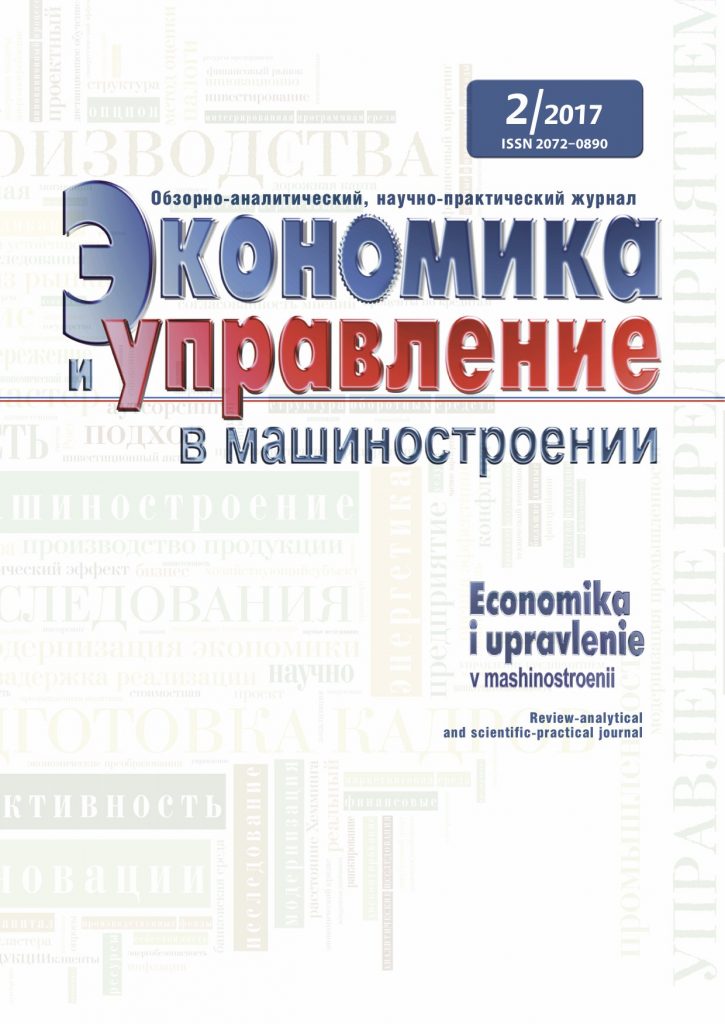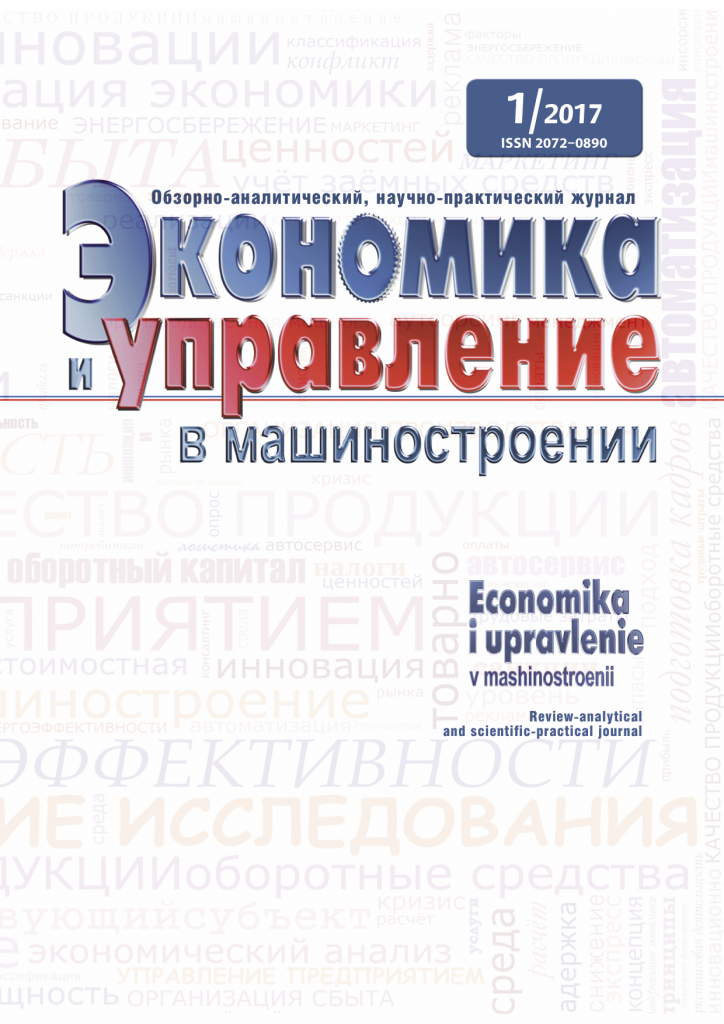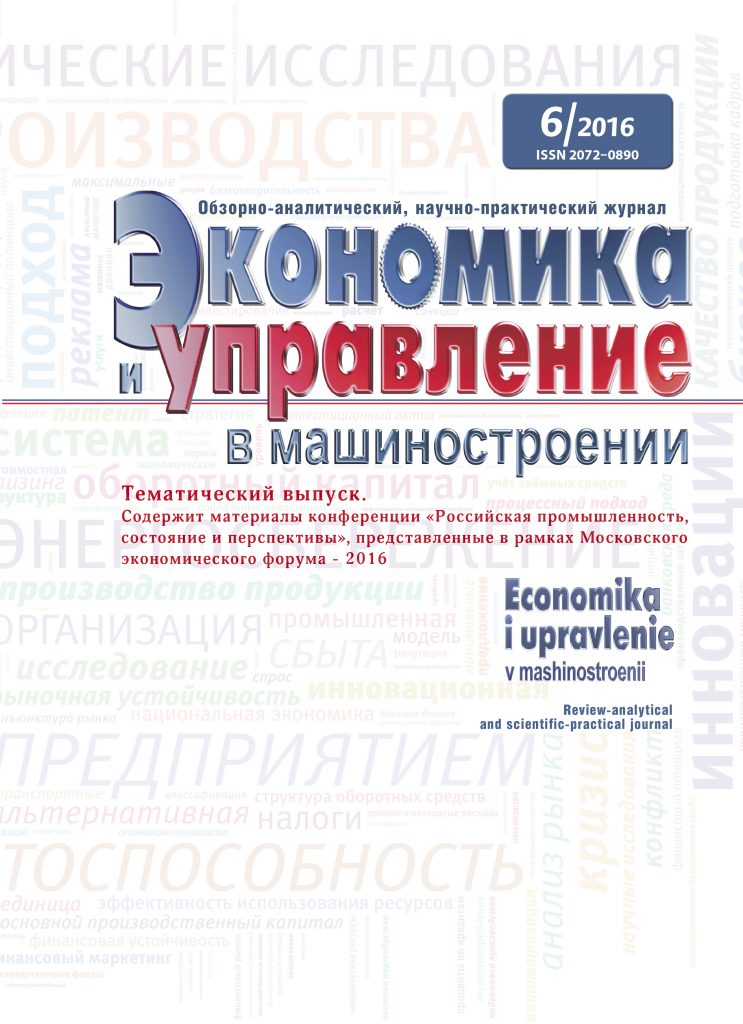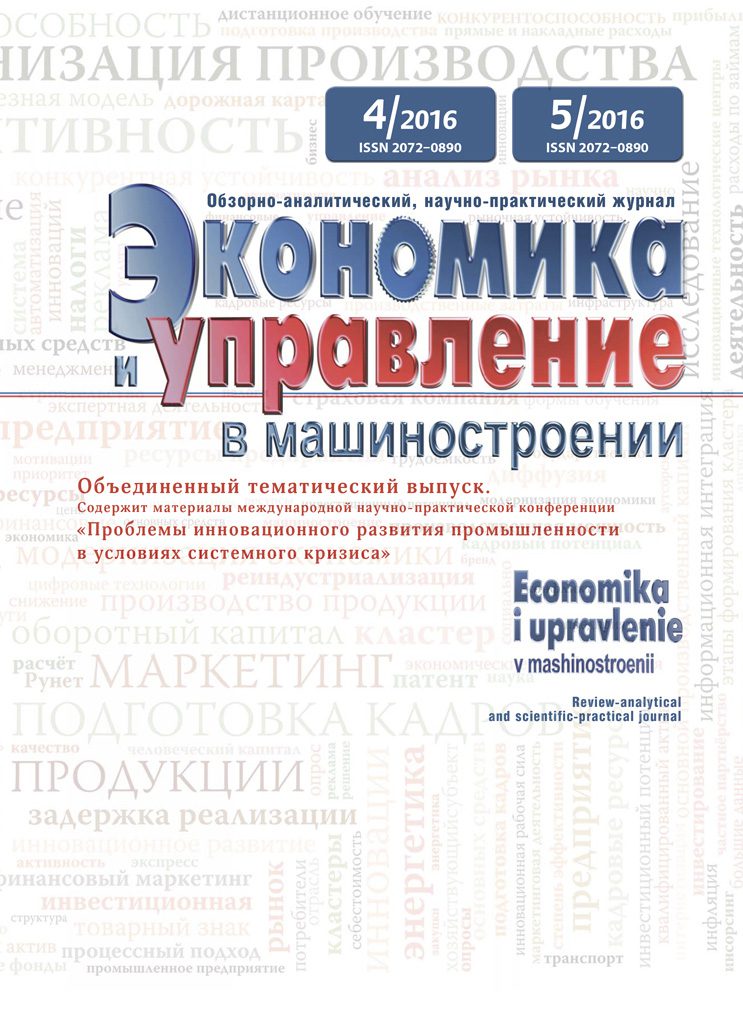OPERATION OF BUSINESS, INDUSTRIAL ENGINEERING
Environmental innovatics – modern approach to the humanity critical global problems solution (Part 2)
Golov R.S., doctor of economic sciences, professor, Director of Management, Economics and Social Technologies Institut
Moscow Aviation Institute (National Research University), Moscow
Sorokin A.E., candidate of economic sciences, associate professor, Head of the Ecology and Safety activities Department
Moscow Aviation Institute (National Research University), Moscow
Metechko L.B., candidate of economic sciences, associate professor, deputy head at the Ecology and Safety activities Department Moscow Aviation Institute (National Research University), Moscow
Milnik A.V., candidate of economic sciences, associate professor at the Energy service and power management Department
Moscow Aviation Institute (National Research University), Moscow
Abstract:The article considers a new direction of scientific research born in Moscow aviation Institute. In the era of global ecological crisis is inevitable to search for new ways and approaches to knowledge, as the former analytical techniques for the study of complex systems has not yielded the desired results, and new discoveries often occur at the intersection of different scientific fields. Modern scientific studies are convergent, they are characterized by a cluster strategy of innovative scientific research, providing a systematic implementation of innovative projects. Given convincing arguments of the effectiveness of the new approach to scientific studies on the example project for the development and pilot implementation of ecological compensation system to reduce anthropogenic pollution of coastal waters, which combined achievements of high technology instrumentation, Metrology, information-measuring devices, methods of environmental control, applied environmental calculations, the latest developments in the field of Informatics, computer technology and innovative methods of teaching environmental knowledge. Examples of such a synthetic approach to cognition demonstrate innovation and opening up of national research center «Kurchatov Institute», headed by M. V. Kovalchuk and other well-known international and domestic research centers use innovative methods of research combining different scientific schools and demonstrate innovative breakthroughs in the knowledge of the laws of the material universe.
Keywords: convergent science and technology cluster strategy development, innovation clusters, cognitive abilities, ecological compensation system, aquatekture, automated environmental monitoring, non-invasive environmental programs, storage and transmission of data, management of ecological safety
Organization of cluster project office functioning
Gorchakova E. A., postgraduade at the Department of Economy in energetics and industry
National Research University “MPEI”, Moscow
Kovalchuk J. A., doctor of economic sciences, professor, chief researcher
Market Economy Institute of Russian Academy of Sciences, Moscow
Abstract:The article describes the possibilities of energy efficiency projects in the context of implementation in industrial clusters. Identified the peculiarities of such projects – synergy, the irrevocability of cost, nature of recovery, sources of funding, possibility of cooperation, the role of energy companies. Highlighted the key aspects of the functioning of the project office on the most significant stages of selection of project, formation of results, choice of control points. A distinctive feature of the proposed approach is the use of the model efficiency based on expert assessments (a method of «fuzzy triple numbers» and the ROV- method – real options valuation) that allows you to identify the confidence interval of the effectiveness of the project.
Keywords: energy efficiency, energy consumption, project office, coordination, industrial cluster, budgeting, real option
Methodological basis for the scientific-industrial clusters’ socio-economic efficiency assessment
Prokofiev D. A., postgraduate at the Energy service and power management Department
Moscow Aviation Institute (National Research University), Moscow
Abstract: The article is devoted to the problem of forming a methodology for assessing the socio-economic efficiency of scientific and industrial clusters. The author justifies the relevance of the cluster approach to the development of the economy. The definition of the scientific and industrial cluster is being developed. A methodology is developed for assessing the socio-economic efficiency of scientific and industrial clusters based on the choice of the criterion of net discounted income.
Keywords: industrial modernization, scientific and industrial cluster, efficiency evaluation, social effect, ecological effect, synergetic effect
Practical usage of expert assessment method for risks identification in concrete projects
Galetov I. D., candidate of economic sciences, associate professor at the Financial management Department
Moscow Aviation Institute (National Research University), Moscow
Shtrikunova M. M., candidate of economic sciences, associate professor at the Financial management Department
Moscow Aviation Institute (National Research University), Moscow
Kitaev Evgeny E. A., Specialist of Department of private label goods production organization
JSC «Voentorg», Moscow
Abstract: The authors expose the range of current risk assessment methods implementation at the enterprise in general, for such enterprises which never intend to use qualified personnel.. The object of the current research is an organization’s internal tool for efficient usage of expert opinions in order to estimate the risk in concrete projects, providing a significant company’s growth. The decision making result while this method usage allows to attract qualified and competent workforce, which as result allows to achieve objectivity above the sustainable risk level and damage threats that could be an obstacle on a avenue to successful implementation of the organization project activities. The expert group flexibility as a result expands the project activities range and also allows to find creative and productive solutions in order to reduce the project risks, and last but not least, successful realization.
Keywords: project, Hamming distance, opinions coherence, standard deviation, importance level, permissible error of the examination, cluster, clustering threshold value
Lease payments: structure, major influence factors, methods
Tikhonov G. V., candidate of economic sciences, Head of Economics Department
Moscow Aviation Institute (National Research University), Moscow
Pushkareva M. B., candidate of economic sciences, associate professor, deputy head of the Energy service and power management Department
Moscow Aviation Institute (National Research University), Moscow
Titov L. Y., doctor of economic sciences, professor at the Economics Department
Moscow Aviation Institute (National Research University), Moscow
Abstract: The calculating methods of lease payments in modern conditions of enterprises functioning for the leasing repayment reliability determination taking into account the real lessee possibilities is given.
As the approach method of lease payments calculation based on the companies-lessees financial level, the author proposes to use not only private performance at the recommended financial indicators lower limits, but also generalized the result obtained on the basis of the calculations and selection of the enterprises-lessees from the small and medium-sized enterprises through their ranking.
Proposed leasing arrangement will improve the efficiency of leasing transactions and broaden the technical re-equipment of small and medium engineering enterprises.
Keywords: leasing, technical re-equipment, the lessor, ranking, financial performance
ENERGY SAVING AND ENERGY EFFICIENCY
Credit and tax instruments for energy efficiency technologies introduction
Mikheev D. V., assistant at the department of Electric Supply of Industrial Enterprises and Electrotechnologies, assistant at the department of Management in Power Engineering and Industry
National Research University “MPEI”, Moscow
Abstract: Decree of the Government of the Russian Federation (RF) No600 (dated June 17, 2015) and the Tax Code of the Russian Federation provides preferential tax and credit regimes for industrial enterprises using energy efficient equipment, including renewable energy sources (RES). The purpose of the work is to determine the positive economic effect for organizations implementing RES (wind power plants as an example), including the accelerated depreciation (AD) and investment tax credit (ITC), the application of which is regulated by these regulatory legal acts. The economic effect was estimated on the basis of a comparison of indicator values «Discounted Total Cost of Ownership» for introduction projects of wind power plants using AD and ITC and without their using. The method for determining this indicator was adjusted by the author taking into account regulatory legal acts of the Russian Federation in the field of taxation and energy saving. The results of calculations demonstrates the effectiveness of applying the provisions of Decree of the Government of the RF No600 (dated June 17, 2015) and the Tax Code of the RF with in order to stimulate enterprises to introduce energy efficient equipment and RES.
Keywords: industrial enterprises; wind power plant; renewable energy sources; Tax Code of the Russian Federation; energy efficiency; energy efficiency indicators; discounted total cost of ownership
Energy saving management as energy marketing element
Soldatova N. F., candidate of economic sciences, associate professor at the Management Department
Financial University under the Government of the Russian Federation, Moscow
Abstract: For the successful operation on the Russian market industrial enterprises must continually increase their competitiveness. One of the competitiveness growth factors of industrial companies is a continuous and sustainable efficiency increasing and energy saving programs introduction. Energy marketing management pays great attention to the new structures creation, forming new goals and objectives for staff about energy saving questions. The aim of this research is to evaluate the prevailing system of staff motivation to improve energy efficiency and the «energy saving» tool usage . Instrumentality and methodological study unit is based on methods of induction, deduction, marketing development processes system analysis elements in the electricity sector, based on quantitative and qualitative methods, as well as logical, statistical and situational analysis methods. Theoretical results of the research can be used to conduct a comprehensive analysis of staff motivation system as a whole and its parts – the subsystems of motivation to encourage energy efficiency in industrial company.
Keywords: marketing in electrical power engineering, marketing researches, energy saving, energy efficiency, marketing personnel, electricity
Structure and functions analysis of information-analytical systems in energy management
Teplyshev V. Y., candidate of economic sciences, Head of the Energy service and power management Department
Moscow Aviation Institute (National Research University), Moscow
Abstract: The article is devoted to the research of modern automation systems’ structure and functions in energy management. The author considers general groups of tasks and automated processes, two types of classification of energy management automated processes are formed according to ISO 50001: 2011. As an example of information-analytical system in energy management, the author shows the «GIS TBN Energo» system
Keywords: energy saving, energy management, energy service, automation, information-analytical systems
MARKETING, SALES APPROACH
Specifics of communications in social marketing
Kozlova N. P., candidate of economic sciences, associate professor at the Management Department
Financial University under the Government of the Russian Federation, Moscow
Abstract: In the article we look through system of communications in social marketing, define goals and objectives of communications, analyze the process of developing communication strategies, assess the effectiveness of individual distribution channels of communications and their effectiveness.
Keywords: social marketing, social programs, communications, promotion, target audience, advertising, public relations, personal selling, fundraising
EDUCATION AND PERSONNEL TRAINING
Selection of industrial standards for educational programs updating
Rozhkov V. N., candidate of engineering Sciences, candidate of engineering Sciences, professor at the Aircraft testing Department Moscow Aviation Institute (National Research University), Moscow
Abstract: Article is directed to the solution of an urgent problem of production standards and educational programs requirements coordination. The article substantiates the necessity of taking into account the aggregate of standards for professional activities various types. The author proposes standards selection criteria in the professional competencies formation and educational programs updating.
Keywords: production personnel, qualification, requirements, industry standard, of professional activities area, activity, educational program
ANALYTICAL INVESTIGATIONS
Small entrepreneurship and its role in processing productions
Prorokov A. N., candidate of economic Sciences, associate professor, professor at the Department of economy and entrepreneurship, full member of Academy of management in education and culture, honorary professor of «Economy and Management of the National Economy» Department, honored economist of Free economic society of Russia
Moscow state regional university, Moscow
Abstract: Small business in the modern economy is an important factor for sustainable socio-economic development and stability of the state. It is the economy sector which aims to provide employment and income growth, to increase the domestic market capacity and actively innovate. Direct public administration methods in this activity field don’t yield necessary result; indicators of its contribution to national economy are inferior to indicators of the most developed and rapidly developing countries sector, due to differences in the accounting methodology for small businesses. The share of small enterprises in turnover of the processing productions and, in particular, in production of machine-building products is rather low.
Keywords: small entrepreneurship, small enterprise, methods of governance, Government support, economically active population, small entrepreneur, prosessing productions, machine-building products, informal sector
Description of Russian economy branches’ sustainable development assessment technique
Trifonov P. V., candidate of economic sciences, associate professor at the Management Department
Financial University under the Government of the Russian Federation, Moscow
Abstract: The paper formulates the methodology for assessing the institutional mechanisms for ensuring the economic branches’ sustainable development. Multi-criteria evaluation system of the Russian economy sustainable development is proposed on the basis of indicators set formed by nine functional clusters, and an integral index of the sustainable development level of the Russian economy is proposed. Practical application of the sustainable development system monitoring of the Russian economy will help to increase the reliability and validity of efficiency assessments and sustainability of different types of industries, and also, on the basis of the results of a multi-criteria evaluation, identify potential opportunities and reserves for the industries and industrial complexes development, and minimize risks.
Keywords: sustainable development, branch economy, added gross value, stability coefficient, imbalance degree
Key principles of industry modernization in the context of economy reindustrialization of Russia
Golov R. S., doctor of economic sciences, professor, Director of Management, Economics and Social Technologies Institute
Moscow Aviation Institute (National Research University), Moscow
Milnik A. V., candidate of economic sciences, associate professor at the Energy service and power management Department
Moscow Aviation Institute (National Research University), Moscow
Abstract: The authors’ analysis is based on an analysis of the current economic situation in industry, which resulted from unsolved systemic problems and the recent crisis. The analysis of one of the most important indicators of the industrial system state – the production equipment wear degree. As a single approach to industrial modernization, the paradigm of economic re-industrialization is proposed. The authors develop key principles of industrial modernization in accordance with the most serious barriers to its development, determined as a result of the analysis.
Keywords: industry, economic crisis, modernization, economic re-industrialization, innovative-investment activity.




